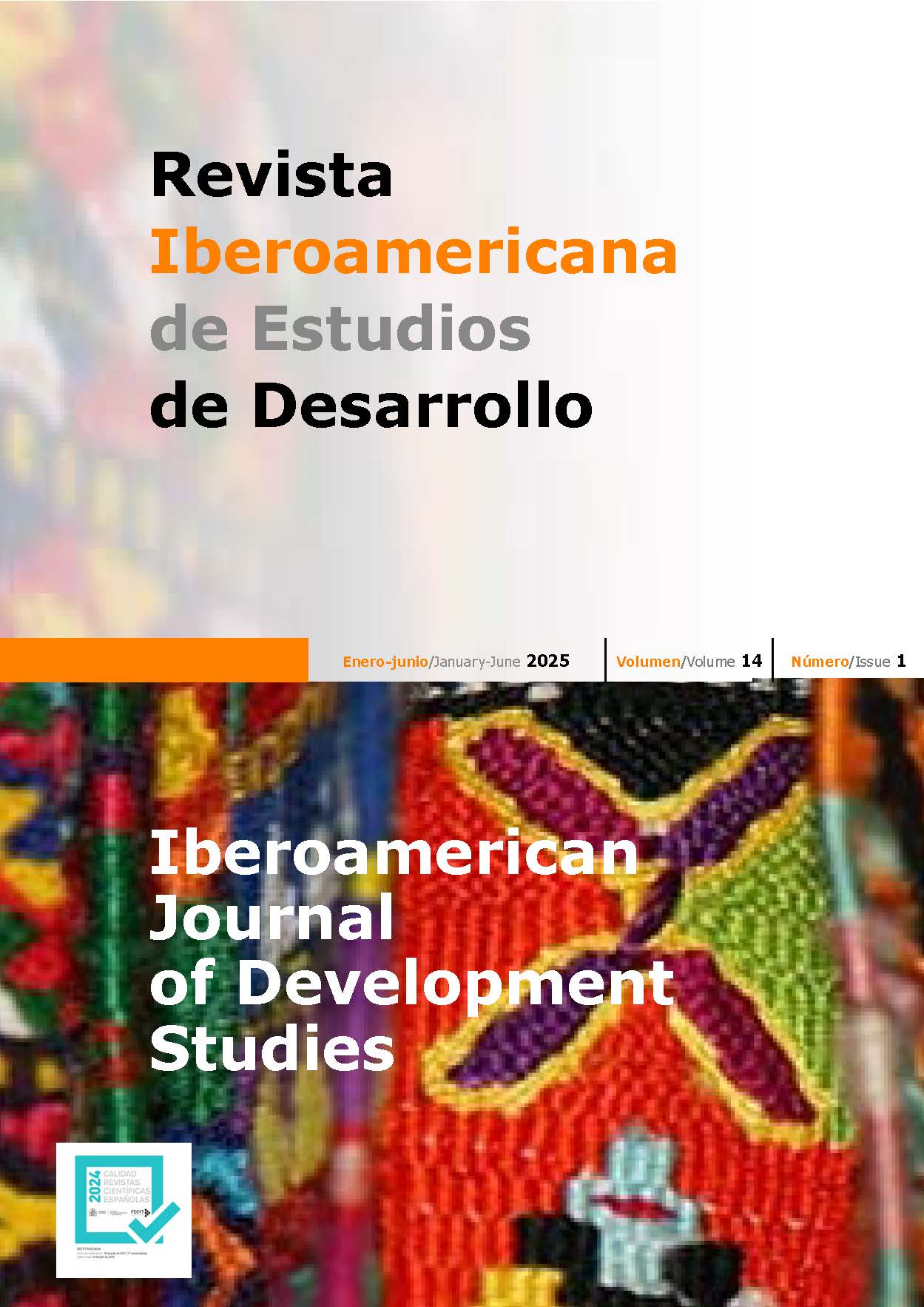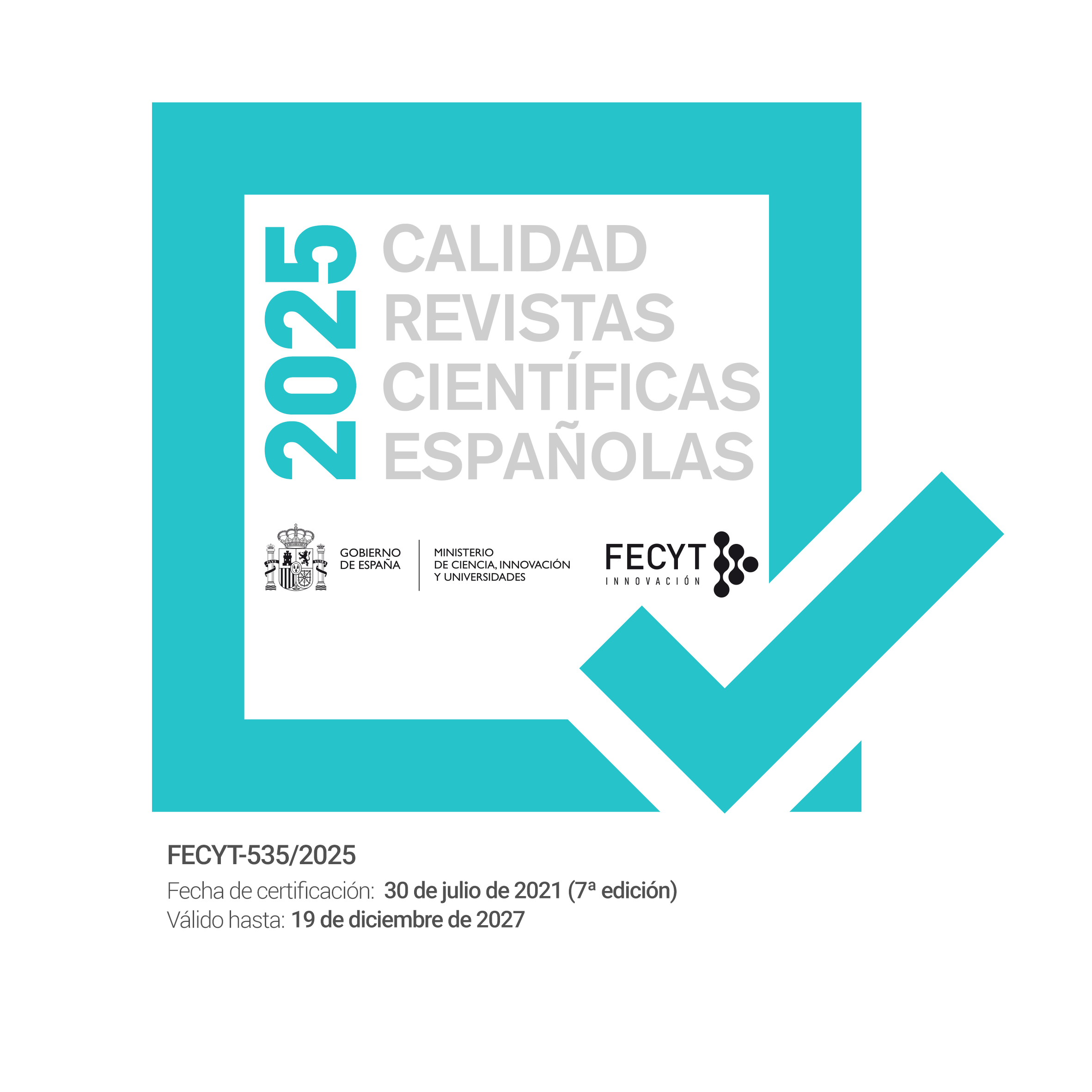Redefining the model: cooperatives in the just ecosocial transition paradigm
DOI:
https://doi.org/10.26754/ojs_ried/ijds.10576Keywords:
cooperativism, just ecosocial transition, impact assessment, sustainable development, Theory of ChangeAbstract
This study examines the integration of cooperativism within the just ecosocial transition paradigm, addressing the urgent need for sustainable and equitable economic development. It analyses the alignment of cooperative principles with multidimensional justice considerations, including environmental, social, climate, energy and labour, to identify a framework where cooperatives act as key agents in promoting a just ecosocial transition. A narrative literature review was employed to critically analyse the theoretical and practical interconnections between cooperativism and just ecosocial transition, revealing both opportunities and inherent contradictions. The results and discussion indicate that, although cooperatives inherently support the dimensions of justice crucial to a just ecosocial transition, practical implementation often reveals challenges, particularly in balancing these ideals with market dynamics. A proposal has been made to overcome those challenges based on impact assessment methodologies, such as the Theory of Change.
Downloads
References
ABRAM S, ATKINS E, DIETZEL A, JENKINS K, KIAMBA L, KIRSHNER J, KREIENKAMP J, PARKHILL K, PEGRAM T, SANTOS AYLLÓN LM (2022). Just Transition: a whole-systems approach to decarbonisation. Climate Policy 22(8):1033-1049. DOI: https://doi.org/10.1080/14693062.2022.2108365
AGIRRE I, REINARES P, AGIRRE A (2014). Antecedents to market orientation in the worker cooperative organization: the Mondragon group. Annals of Public and Cooperative Economics 85(3):387-408. DOI: https://doi.org/10.1111/apce.12044
ALLEN C, MALEKPOUR S (2023). Unlocking and accelerating transformations to the SDGs: a review of existing knowledge. Sustainability Science 18(4):1939-1960. DOI: https://doi.org/10.1007/s11625-023-01342-z
ALTMAN M (2020). Are there core cooperative principles required for cooperative economic success and sustainability? In: Waking the Asian Pacific Co-Operative Potential. Academic Press, pp 19-33. DOI: https://doi.org/10.1016/B978-0-12-816666-6.00003-3
BAINTON N, KEMP D, LÈBRE E, OWEN JR, MARSTON G (2021). The energy‐extractives nexus and the just transition. Sustainable Development 29(4):624-634. DOI: https://doi.org/10.1002/sd.2163
BASILICO S, GRASHOF N (2024). Accelerating the sustainability transition of brown regions: unlocking the speed factor. Environmental Innovation and Societal Transitions 51. DOI: https://doi.org/10.1016/j.eist.2024.100840
BELLO-BRAVO J, MEDENDORP JW, PITTENDRIGH B (2022). Just participation or just participation? A participatory justice model for more successful theory of change design, implementation, and solution uptake. Heliyon 8(7). DOI: https://doi.org/10.1016/j.heliyon.2022.e09808
BELMONTE J, GUERRERO AJ, CABRERA A (2018). La evolución del movimiento cooperativo desde su origen hasta la actualidad a través de su máximo exponente: La Sociedad Cooperativa. European Scientific Journal ESJ 14(29). DOI: https://doi.org/10.19044/esj.2018.v14n29p53
BIRCHALL J, SIMMONS R (2009). Co-operatives and the economic crisis. International Labour Organization.
CASTILLA-POLO F, SÁNCHEZ-HERNÁNDEZ MI (2020). Cooperatives and sustainable development: a multilevel approach based on intangible assets. Sustainability 12(10):4099. DOI: https://doi.org/10.3390/su12104099
CHANCEL L, PIKETTY T, SAEZ E, ZUCMAN G (2022). World Inequality Report 2022. Harvard University Press. DOI: https://doi.org/10.4159/9780674276598
CIGNA L, FISCHER T, ABUANNAB E, HEINS E, RATHGEB P (2023). Varieties of Just Transition? Eco-Social Policy Approaches at the International Level. Social Policy and Society 22:730-746. DOI: https://doi.org/10.1017/S1474746423000192
CIPLET D, HARRISON JL (2020). Transition tensions: mapping conflicts in movements for a just and sustainable transition. Environmental Politics. DOI: https://doi.org/10.1080/09644016.2019.1595883
CLARK C, ROSENZWEIG W, LONG D, OLSEN S (2004). Double Bottom Line Project Report: Assessing Social Impact in Double Bottom Line Ventures. Working Paper Series No. 13. University of California: Berkeley (California).
CONNELL JP, KUBISCH AC (1998). Applying a theory of change approach to the evaluation of comprehensive community initiatives: progress, prospects, and problems. New Approaches to Evaluating Community Initiatives 2(15-44):1-16.
COVENTRY P, OKEREKE C (2017). Climate change and environmental justice. In: The Routledge Handbook of Environmental Justice. Routledge, London, pp. 362-373. DOI: https://doi.org/10.4324/9781315678986-29
EVANS G, PHELAN L (2016). Transition to a post-carbon society: linking environmental justice and just transition discourses. Energy Policy 99:329-339. DOI: https://doi.org/10.1016/j.enpol.2016.05.003
FELLI R (2014). An alternative socio-ecological strategy? International trade unions’ engagement with climate change. Review of International Political Economy 21(2):372-398. DOI: https://doi.org/10.1080/09692290.2012.761642
FLECHA R, NGAI P (2014). The challenge for Mondragon: searching for the cooperative values in times of internationalization. Organization 21(5):666-682. DOI: https://doi.org/10.1177/1350508414537625
GALERA G, CHIOMENTO S (2022). L’impresa sociale: dai concei teorici all’applicazione a livello di policy. Impresa Sociale 1.
GARCÍA-GARCÍA P, CARPINTERO Ó, BUENDÍA L (2020). Just energy transitions to low carbon economies: a review of the concept and its effects on labour and income. Energy Research & Social Science 70:101664. DOI: https://doi.org/10.1016/j.erss.2020.101664
GARTEIZ-AURRECOA JD (2016). Breve estudio de la evolución histórica del pensamiento cooperativo. Deusto Estudios Cooperativos 8:13-34. DOI: https://doi.org/10.18543/dec-8-2016pp13-34
GARZON A (2022). The Limits to Growth Ecosocialism or Barbarism. Monthly Review-An Independent Socialist Magazine 74(3):35-53. DOI: https://doi.org/10.14452/MR-074-03-2022-07_2
GÖSSLING S, REINHOLD S (2024). Accelerating small and medium sized tourism enterprises’ engagement with climate change. Journal of Sustainable Tourism: 1-18. DOI: https://doi.org/10.1080/09669582.2024.2350659
HAMPTON P (2015). Workers and Trade Unions for Climate Solidarity. Routledge, London. DOI: https://doi.org/10.4324/9781315732220
HARRIS DM, MCCARTHY J (2023). A just transition to what, for whom, and by what means? Transition technology, carbon markets, and an Appalachian coal mine. Energy Research & Social Science 106:103307. DOI: https://doi.org/10.1016/j.erss.2023.103307
HARRIS PG, SYMONS J (2010). Justice in adaptation to climate change: cosmopolitan implications for international institutions. Environmental Politics 19(4):617-636. DOI: https://doi.org/10.1080/09644016.2010.489716
HEALY N, BARRY J (2017). Politicizing energy justice and energy system transitions: fossil fuel divestment and a «just transition». Energy Policy 108:451-459. DOI: https://doi.org/10.1016/j.enpol.2017.06.014
ICA (INTERNATIONAL CO-OPERATIVE ALLIANCE) (2021). Co-operative identity, values & principles. https://www.ica.coop/en/cooperatives/cooperative-identity, acceso 9 de septiembre de 2024.
IPCC (2023). Climate Change 2023: Report. Geneva.
KÖHLER J, GEELS FW, KERN F, MARKARD J, ONSONGO E, WIECZOREK A, ALKEMADE F, AVELINO F, BERGEK A, BOONS F, FÜNFSCHILLING L, HESS D, HOLTZ G, HYYSALO S, JENKINS K, KIVIMAA P, MARTISKAINEN M, MCMEEKIN A, MÜHLEMEIER MS, NYKVIST B, PEL B, RAVEN R, ROHRACHER H, SANDÉN B, SCHOT J, SOVACOOL B, TURNHEIM B, WELCH D, WELLS P (2019). An agenda for sustainability transitions research: state of the art and future directions. Environmental Innovation and Societal Transitions 31:1-32. DOI: https://doi.org/10.1016/j.eist.2019.01.004
KONČALOVIĆ D, NIKOLIĆ J, DŽOKIĆ A, MOMČILOVIĆ P, ŽIVKOVIĆ D (2023). Energy cooperatives and just transition in Southeastern Europe. Energy, Sustainability and Society 13(1):21. DOI: https://doi.org/10.1186/s13705-023-00400-9
KUHLMAN T, FARRINGTON J (2010). What is sustainability? Sustainability 2(11):3436-3448. DOI: https://doi.org/10.3390/su2113436
MALAKAR Y, WALTON A, PEETERS LJ, DOUGLAS DM, O’SULLIVAN D (2024). Just trade-offs in a net-zero transition and social impact assessment. Environmental Impact Assessment Review 106:107506. DOI: https://doi.org/10.1016/j.eiar.2024.107506
MARIN G, VONA F (2017). The impact of energy prices on employment and environmental performance: evidence from French manufacturing establishments. DOI: https://doi.org/10.2139/ssrn.3089662
MARKANDYA A, ARTO I, GONZÁLEZ-EGUINO M, ROMÁN MV (2016). Towards a green energy economy? Tracking the employment effects of low-carbon technologies in the European Union. Applied Energy 179:1342-1350. DOI: https://doi.org/10.1016/j.apenergy.2016.02.122
MCCAULEY D, HEFFRON RJ (2018). Just transition: integrating climate, energy and environmental justice. Energy Policy 119:1-7. DOI: https://doi.org/10.1016/j.enpol.2018.04.014
NAGAO-MENEZES DF (2023). Las sociedades cooperativas como herramienta para la implementación de los Objetivos de Desarrollo Sostenible. Gizaekoa ‒ Revista Vasca de Economía Social 20.
NIKOLIĆ M, BOŽIĆ I, BOŽIĆ D (2021). Cooperative principles in practice: experiences of Serbia. Western Balkan Journal of Agricultural Economics and Rural Development (WBJAERD) 3(2):97-110. DOI: https://doi.org/10.5937/WBJAE2102097N
NOVKOVIC S (2005). Cooperative business: what is the role of cooperative principles and values? In: International Cooperative Alliance Research Conference Cork, Ireland.
NOVKOVIC S (2008). Defining the co-operative difference. The Journal of Socio-Economics 37(6):2168-2177. DOI: https://doi.org/10.1016/j.socec.2008.02.009
NOVKOVIC S (2019). Are co-operatives transformative, or just businesses? Working Paper 2019-02. International Centre for Co-operative Management.
NOVKOVIC S (2022). Cooperative identity as a yardstick for transformative change. Annals of Public and Cooperative Economics 93(2):313-336. DOI: https://doi.org/10.1111/apce.12362
NOVKOVIC S, PUUSA A, MINER K (2022). Co-operative identity and the dual nature: from paradox to complementarities. Journal of Co-operative Organization and Management 10(1):100162. DOI: https://doi.org/10.1016/j.jcom.2021.100162
PARÉ G, TRUDEL MC, JAANA M, KITSIOU S (2015). Synthesizing information systems knowledge: a typology of literature reviews. Information & Management 52(2):183-199. DOI: https://doi.org/10.1016/j.im.2014.08.008
PÎNZARU F, DIMA AM, ZBUCHEA A, VEREȘ Z (2022). Adopting sustainability and digital transformation in business in Romania: a multifaceted approach in the context of the just transition. The Amfiteatru Economic Journal 24(59):27-44. DOI: https://doi.org/10.24818/EA/2022/59/28
RAINNIE A, SNELL D (2024). Just Transition in Australia depoliticisation? Contemporary Social Science: 1-20. DOI: https://doi.org/10.1080/21582041.2024.2317393
RAWLS J (1971). A Theory of Justice. Harvard University Press, Cambridge. DOI: https://doi.org/10.4159/9780674042605
RICHARDSON K, STEFFEN W, LUCHT W, BENDTSEN J, CORNELL SE, DONGES JF, ET AL. (2023). Earth beyond six of nine planetary boundaries. Science Advances 9(37):eadh2458. DOI: https://doi.org/10.1126/sciadv.adh2458
ROCKSTRÖM J, SACHS JD, ÖHMAN MC, SCHMIDT-TRAUB G (2013). Sustainable development and planetary boundaries. Sustainable Development Solutions Network.
ROCKSTRÖM J, STEFFEN W, NOONE K, PERSSON Å, CHAPIN FS III, LAMBIN E, LENTON TM, SCHEFFER M, FOLKE C, SCHELLNHUBER HJ, NYKVIST B, DE WIT CA, HUGHES T, VAN DER LEEUW S, RODHE H, SÖRLIN S, SNYDER PK, COSTANZA R, SVEDIN U, FALKENMARK M, KARLBERG L, CORELL RW, FABRY VJ, HANSEN J, WALKER B, LIVERMAN D, RICHARDSON K, CRUTZEN P, FOLEY J (2009). Planetary boundaries: exploring the safe operating space for humanity. Ecology and Society 14(2):32. DOI: https://doi.org/10.5751/ES-03180-140232
ROSEMBERG A (2010). Building a just transition: the linkages between climate change and employment. International Journal of Labour Research 2(2):125. DOI: https://doi.org/10.5848/ILO.978-9-221254-79-9_2
ROWLSTON N, DUGUID F (2020). Co-operative sustainability performance measurement: the role of the co-op principles and UN sustainable development goals in the reporting model. International Journal of Co-operative Accounting and Management 3(2):4-19.
SCHLOSBERG D, COLLINS L (2021). Environmental justice and the transformation agenda: Making the just transition just. Political Geography.
SCHULTE L, ROBINSON B (2024). Owning the just transition: comparing citizen participation in South African and German wind farms. Contemporary Social Science, pp. 1-31. DOI: https://doi.org/10.1080/21582041.2024.2339940
SNELL D (2018). «Just transition»? Conceptual challenges meet stark reality in a «transitioning» coal region in Australia. Globalizations 15(4):550-564. DOI: https://doi.org/10.1080/14747731.2018.1454679
SNYDER H (2019). Literature review as a research methodology: an overview and guidelines. Journal of Business Research 104:333-339. DOI: https://doi.org/10.1016/j.jbusres.2019.07.039
SOVACOOL BK, AXSEN J, SORRELL S (2018). Promoting novelty, rigor, and style in energy social science: towards codes of practice for appropriate methods and research design. Energy Research & Social Science 45:12-42. DOI: https://doi.org/10.1016/j.erss.2018.07.007
SOVACOOL BK, ANDERSEN R, SORENSEN S, SORENSEN K, TIENDA V, VAINORIUS A, ET AL. (2016). Balancing safety with sustainability: assessing the risk of accidents for modern low-carbon energy systems. Journal of Cleaner Production 112:3952-3965. DOI: https://doi.org/10.1016/j.jclepro.2015.07.059
SPAISER V, RANGANATHAN S, SWAIN RB, SUMPTER DJ (2017). The sustainable development oxymoron: quantifying and modelling the incompatibility of sustainable development goals. International Journal of Sustainable Development & World Ecology 24(6):457-470. DOI: https://doi.org/10.1080/13504509.2016.1235624
STEFFEN W, RICHARDSON K, ROCKSTRÖM J, SCHELLNHUBER HJ, DUBE OP, DUTREUIL S, ET AL. (2020). The emergence and evolution of Earth System Science. Nature Reviews Earth & Environment 1(1):54-63. DOI: https://doi.org/10.1038/s43017-019-0005-6
TRIBALDOS TM, KORTETMÄKI T (2022). Just Transition: Integrating Social Justice and Sustainability. Journal of Environmental Policy & Planning 24(1):89-102.
UPHAM P, SOVACOOL B, GHOSH B (2022). Just transitions for industrial decarbonisation: a framework for innovation, participation, and justice. Renewable and Sustainable Energy Reviews 167:112699. DOI: https://doi.org/10.1016/j.rser.2022.112699
VANCLAY F (2024). After 50 years of social impact assessment, is it still fit for purpose? Current Sociology 72(4):774-788. DOI: https://doi.org/10.1177/00113921231203189
VOGEL I (2012). Review of the use of «Theory of Change» in international development. DFID, London.
WANG X, LO K (2021). Just transition: a conceptual review. Energy Research & Social Science 82:102291. DOI: https://doi.org/10.1016/j.erss.2021.102291
WEBB T, NOVKOVIC S (2014). Co-operatives in a post-growth era. Co-operatives in a Post-Growth Era:1-322. DOI: https://doi.org/10.5040/9781350219380.0004
WELLER S, BEER A, PORTER J (2024). Place-based just transition: domains, components and costs. Contemporary Social Science:1-20. DOI: https://doi.org/10.1080/21582041.2024.2333272
YAKAR-PRITCHARD G, RIDLEY-DUFF R, ÇALIYURT K, AKKUŞ Y (2023). How to study cooperatives for sustainable development. DOI: https://doi.org/10.61869/WKPO5512
Downloads
Published
Issue
Section
License
Copyright (c) 2025 Jon Olaizola-Alberdi, Oier Imaz Alias, Julen Bollain, Beñat Herce-Leceta

This work is licensed under a Creative Commons Attribution-NonCommercial-NoDerivatives 4.0 International License.





